Secrets to buying the best diamond
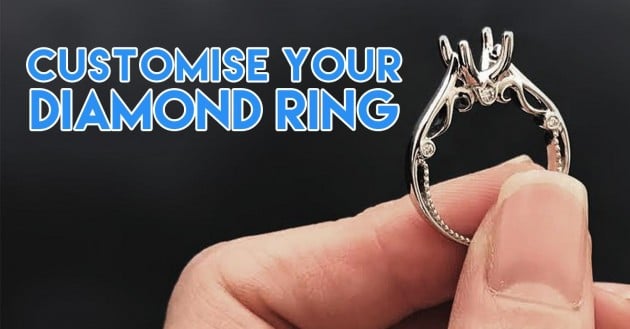
So you’re ready to pop the question, but there’s just one problem – you realise you know NOTHING about jewellery. Buying an engagement ring is not the same as buying the latest Pandora charm for your monthsary. Cham liao.
While a marriage shouldn’t be built on material things, it’s a sweet – and probably expected – gesture to gift your lady a symbol of your love that follows wherever she goes. Listen up, clueless boyfriends – here’s a crash course on how to buy the one ring to rule her heart.
1. Know a diamond’s 4Cs
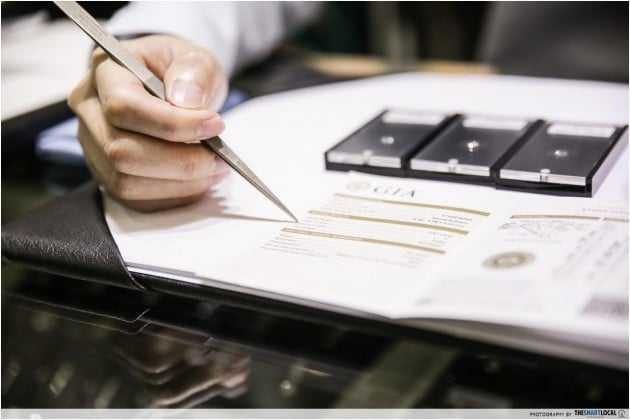
Most people assume that a diamond’s carat number determines its quality, but picking that sparkly rock isn’t that simple. A diamond’s value revolves around these 4Cs, in order of importance:
1. CUT – the facets, proportions and symmetry of a diamond, not the shape itself
2. CARAT – the unit of measurement for a diamond’s weight
3. COLOUR – how white or yellow a diamond appears
4. CLARITY – the presence of natural blemishes on the diamond, usually barely visible to the naked eye
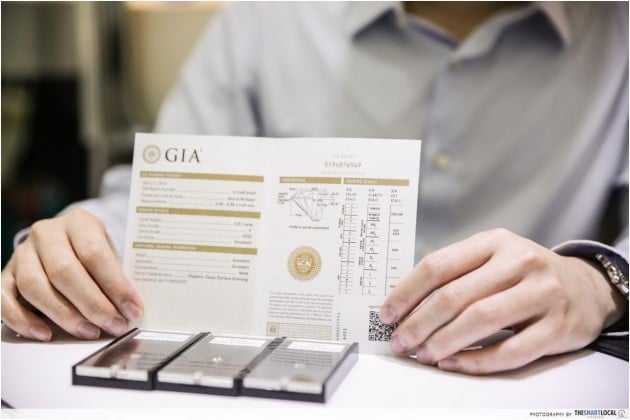
Every authentic store-bought diamond comes with a Gemological Institute of America (GIA) or American Gem Society (AGS) grading certificate stating the properties of its 4Cs. You should receive one with your diamond without having to ask or pay an extra fee. Otherwise, RUN – you’re in grave danger of getting scammed!
Note: There are other types of Certificates available but they’re known to have looser standards.
2. A bigger carat isn’t always better
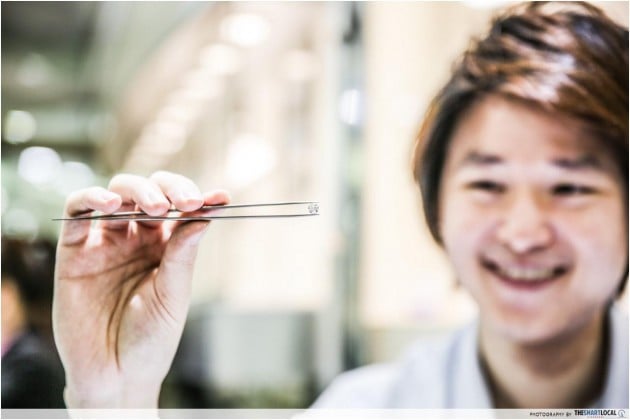
Let’s clear this misconception once and for all – the carat measurement of a diamond refers to weight, not size. A small diamond can have a larger carat, simply because it’s got greater depth, hence weighing more. A diamond with “Super Ideal Cut” proportions would optimize the carat weight of the diamond, making it appear larger from the front.
It’s just like how two cones of ice cream can have the same diameter, but the one that is deeper is able to contain a greater volume and thus a greater weight of ice cream.
3. Avoid certain flat carat numbers
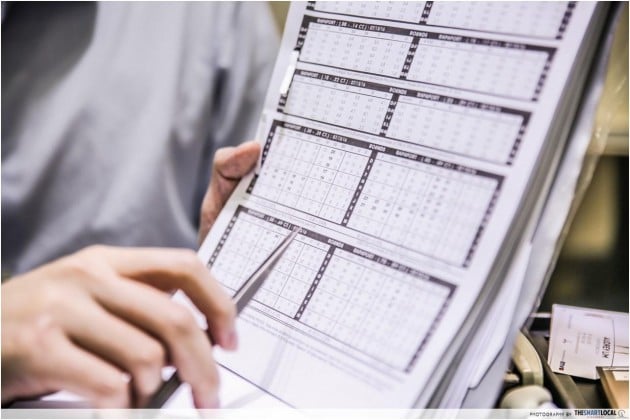
Diamonds are priced based on their carat ranges, which go from 0.3 – 0.39, 0.4 – 0.49, 0.5 – 0.69, and so on. Each range has a significantly different price bracket from the previous, but here’s the thing: quality-wise, a 0.01 carat difference isn’t much of a drop, and makes virtually zero difference in terms of appearance.
To put it in simpler terms, if you were considering say, a 0.7 carat diamond, go for a 0.6+ carat one instead. You’ll save a few hundred bucks which could be put to better use – such as on a gigantic proposal bouquet. *unsubtle hint to my boyfriend*
4. There’s a Math in determining the quality of a diamond’s cut…
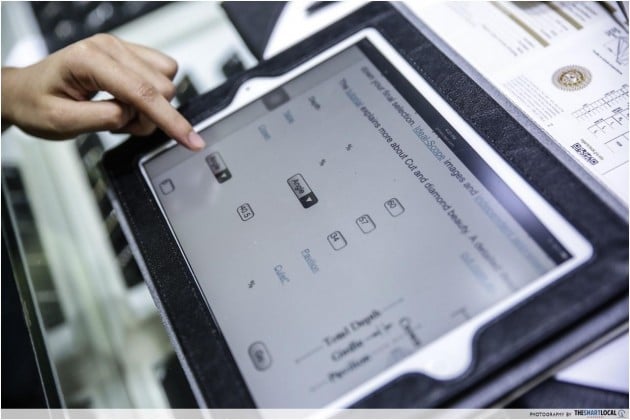
How sparkly a diamond is, is independent of its size – it’s the cut that makes it brilliant. This not only refers to how multifaceted it is, but also the shape and symmetry of the facets themselves. A large, but poorly cut diamond might only look as good as a rhinestone on a toy ring from Toys”R”Us.
Discerning how well-cut a diamond is requires a significant amount of calculation, taking into account multiple factors including the diamond’s depth and even the specific angles of its crown. But don’t worry, simply key the values into a Holloway Cut Advisor (HCA) tool and it’ll do the dirty work for you.
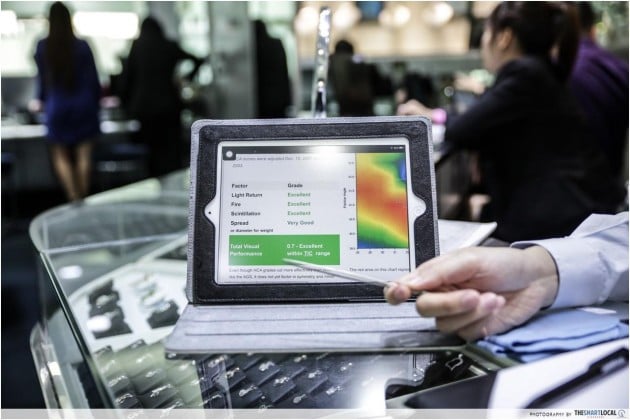
Available online for free, the HCA tool calculates a final score for your diamond from 0.4 to 10 (with 10 being the worst). Excellent Cut diamonds go from 0.4 to 6, Ideal Cut diamonds from 2 and below, and Super Ideal Cut diamonds score 1.4 and below. Used as a means of weeding out bad diamonds rather than for selecting good ones, the HCA tool only picks up on 17 out of 57 facets of a diamond. If the score is poor here, don’t even bother.
5. …As well as a special set of scopes
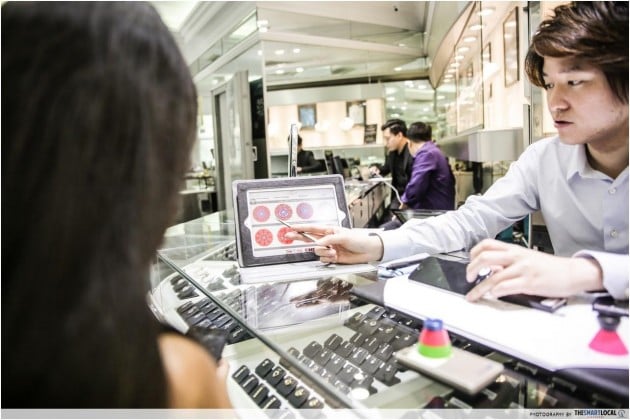
So intricately cut are diamonds that they require up to 3 different kinds of magnifying scopes to be properly scrutinised.
1. Ideal Scope: for light return/performance
A white circle or pocket of whites in the middle of a diamond’s image mean that there are light leakages there. No sparkles will emanate from those areas since there’s no light reflection, causing those bits to appear grey and dull. Two diamonds can be of the same cut and colour, but their sparkle would vary if their light performance differs.
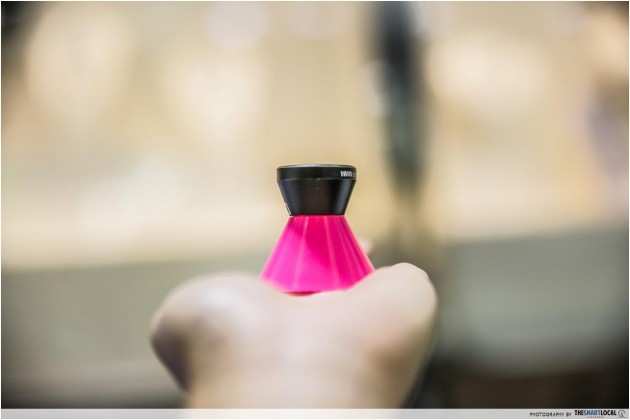
2. AGS ASET (American Gem Society Angular Spectrum Evaluation Tool) scope: the most comprehensive scope available
The AGS ASET scope reveals the quality of a diamond’s cut through diagrams with coloured portions.
White: light leakages
Blue: contrast
Red: full light return
Green: weak light return – avoid gems with this especially at the edges as it’ll cause the gems to look smaller than they actually are.
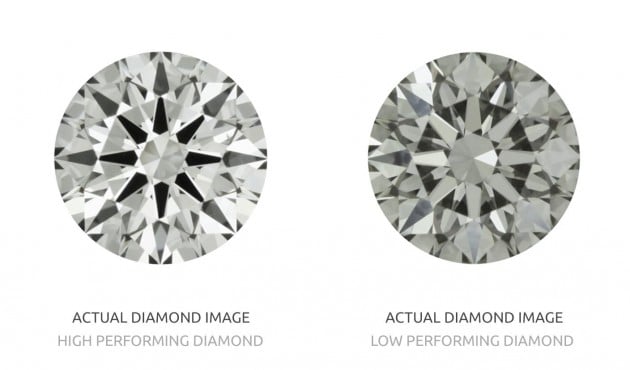
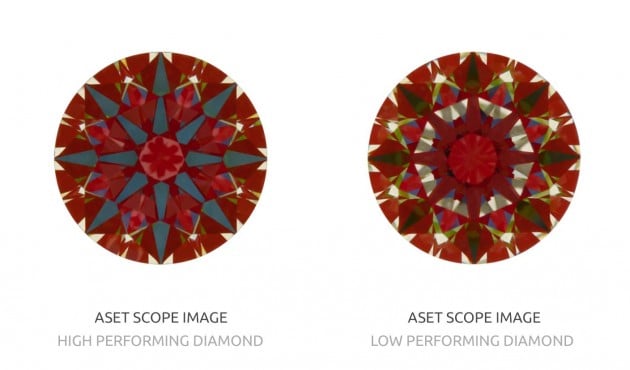
3. Hearts and arrows scope: for viewing symmetry
How symmetrical a diamond is affects the visual symmetry of a diamond. The diagram below shows diamonds with cuts of varying symmetries, from best to worst (L to R):
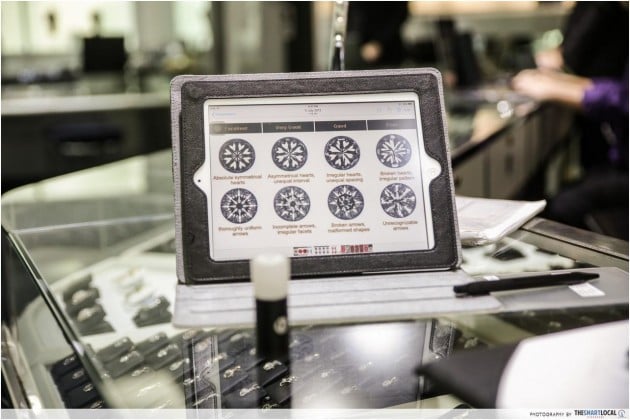
Looking at the diamonds at the extreme right column, an asymmetrical cut would result in unrecognisable hearts and arrows.
Most gem stores in Singapore try to mask such imperfections from unsuspecting customers. ALWAYS ask to look at a gem through a scope even after checking its basic 4C stats, because you won’t know where light leakages lie until you take a closer look.
6. Different lighting can affect how your diamond looks
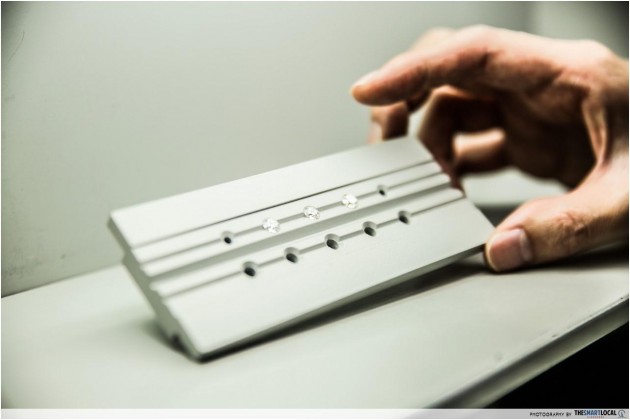
Just like how the HDB fruit stall auntie uses fluorescent lights to make her fruits look more #aesthetic, jewellers also use the same trick to reduce the appearance of light leakages in gems. In addition, LED lighting is utilised in display showcases because it enhances the sparkle or EVERYTHING – even Swarovski crystals. Only for you to take it out in natural lighting and realise it looks rather meh.
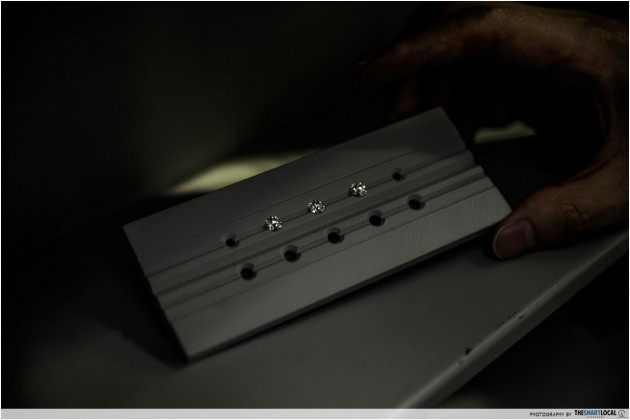
See the difference in sparkle of the gems between this picture and the one before? Lighting can be so deceiving!
Jewellers like JannPaul let you view their stones in a light box which produces different forms of lighting.
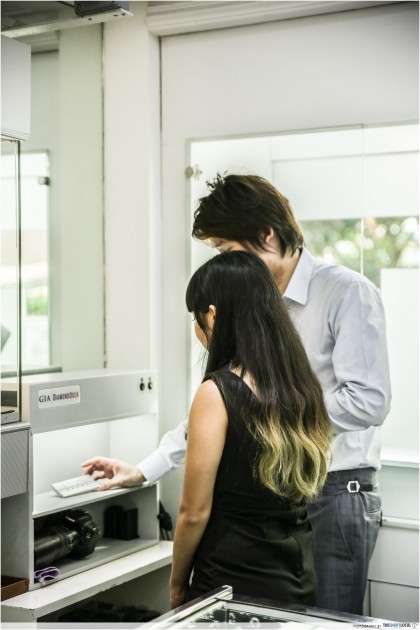
7. Check the colour of a diamond from the back, not front

A diamond’s colour has nothing to do with the shade of its sparkle, but rather the tone of its “body”. This ranges from grades D to Z, with an increasingly yellowish tinge as the letters increase. JannPaul only carries diamonds of colour grade G and above, so you won’t see any with the yellowish tinge.
The right way of comparing diamond colours is to put them side to side on a white sheet of paper, and look at them from the back. Don’t stress yourself over having to get the highest colour grade available – 1 grade difference in colour isn’t obvious from the front, and even harder to discern once the bling is in its setting.
8. Diamonds that come in other shapes are cheaper than round ones
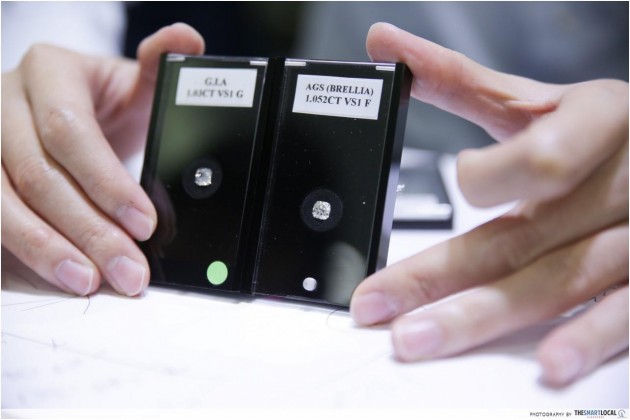
About 40% cheaper, to be exact. Don’t listen to jewellery salesmen who try to tout heart-shaped diamonds at $2,000 more with the rationale of those being “more difficult to cut”. Classic round diamonds are the most valuable and most brilliant as they’re the only ones with hearts and arrows patterns. Diamonds in shapes like heart, pear, cushion, and oval usually have greater light leakages than round ones of the same specs.
Fun fact: Jannpaul is the only jewellery store in Singapore with its own patented cushion and octagon shaped diamonds with the hearts and arrows cut.
9. Make things extra personal with customisation

If your girl is a “high maintenance” one who values exclusivity, JannPaul provides ring setting customisations at no extra charge – the only one in Singapore to do so. This is because all their designs are made from scratch and you’re basically only footing the cost of the raw materials. So go ahead and make fancy requests like textured twists, special engraving, and even Disney princess inspired designs for your princess!
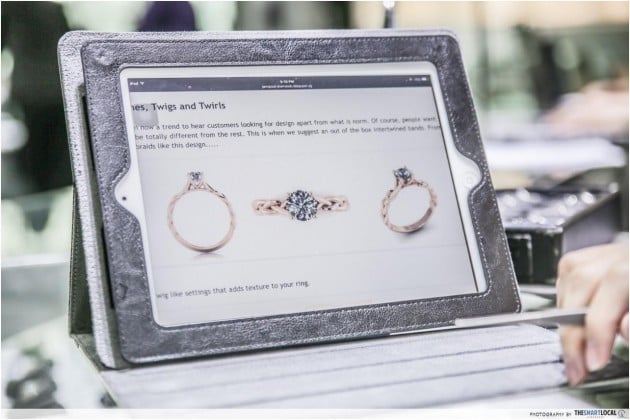
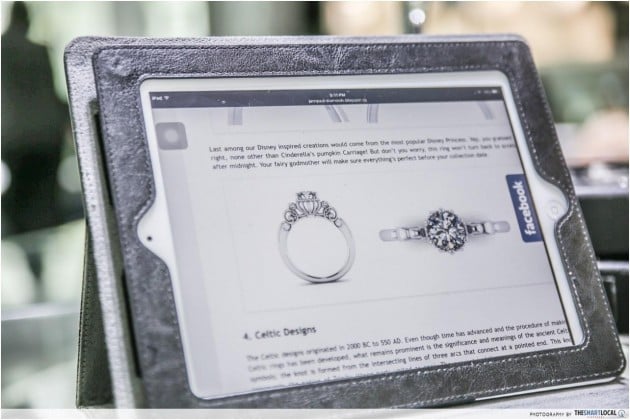
Not the creative sort? Let them know what specifications you have in mind, and their friendly staff will make recommendations. What’s more, JannPaul goes the extra mile to create a 3D render of your chosen gem in its setting so you can see how it’ll look like in real life. You’re allowed to make changes to the 3D model till you’re satisfied. If the ring doesn’t fit post-purchase, you’re given up to 2 size changes for free.
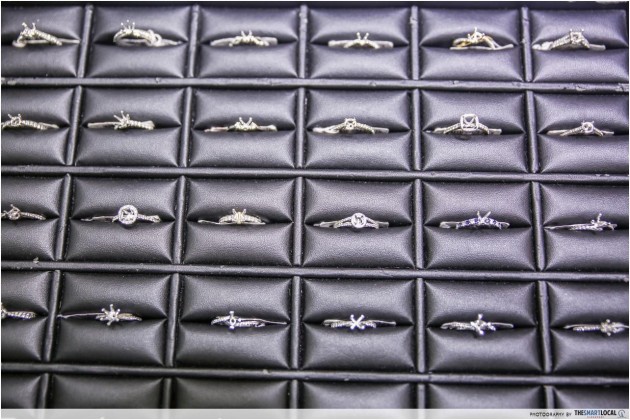
Buy the perfect diamond ring at JannPaul

Specialising in Super Ideal Cut diamonds, JannPaul is a local jewellery store that provides education on diamonds and settings to all its customers at no extra fee. They keep things affordable too, with a 0.5 carat Super Ideal Cut diamond ring costing only $3,000 to $4,000+! As consultations are by appointment basis only, you can be sure that you’ll have full attention and all your needs are catered to.
Now that you’re all set on diamond knowledge, stop ignoring your girlfriend’s hints and putting off the inevitable question – time to go forth and take the plunge!
Find out more about JannPaul here!
This post was brought to you by JannPaul.
